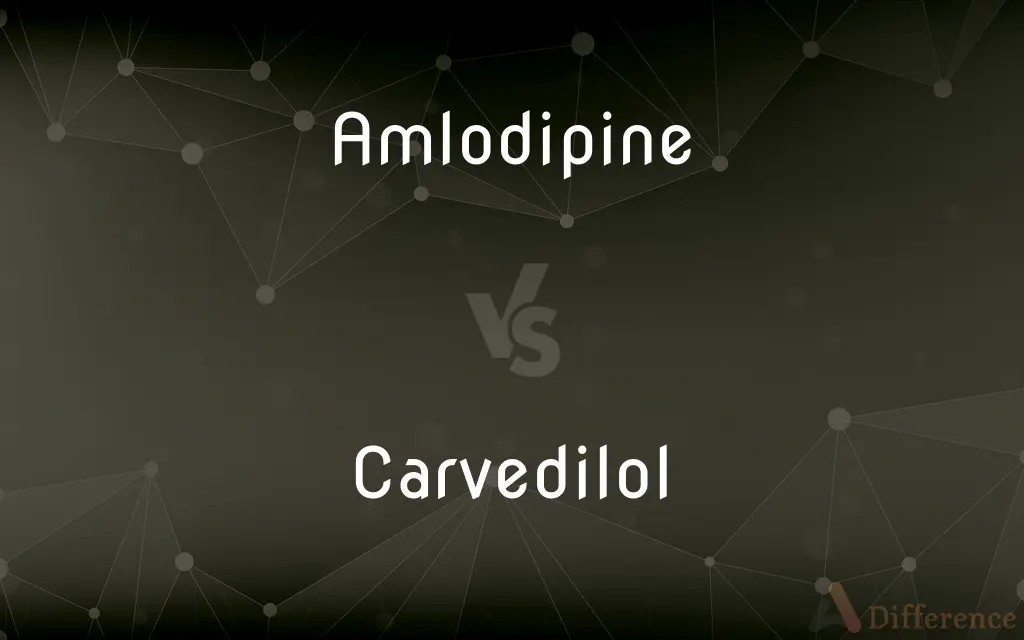Amlodipine vs. Carvedilol — What's the Difference?
By Maham Liaqat & Urooj Arif — Updated on March 28, 2024
Amlodipine is a calcium channel blocker that primarily relaxes blood vessels to lower blood pressure, while carvedilol is a beta-blocker that reduces heart rate and blood pressure by blocking adrenaline effects.

Difference Between Amlodipine and Carvedilol
Table of Contents
ADVERTISEMENT
Key Differences
Amlodipine and carvedilol are both medications used to manage high blood pressure and other heart-related conditions, but they work through different mechanisms and have distinct effects and uses.
Amlodipine operates by inhibiting the flow of calcium ions into vascular smooth muscle and cardiac muscle cells, leading to the relaxation of blood vessels. This vasodilation effect helps to reduce blood pressure and can also increase the supply of blood and oxygen to the heart, making amlodipine particularly useful in treating hypertension and angina (chest pain). On the other hand, carvedilol works by blocking beta-adrenergic receptors, which are part of the sympathetic nervous system's response to stress. By inhibiting these receptors, carvedilol decreases the heart's tendency to beat faster and reduces the force of heart contractions, lowering blood pressure and heart rate. Carvedilol is often prescribed for hypertension, heart failure, and to improve survival after a heart attack, owing to its dual action on beta and alpha receptors, providing vasodilation in addition to beta-blockade.
While both medications are effective in lowering high blood pressure, their choice depends on individual patient factors, including the specific heart conditions being treated, other medical conditions present, and potential side effects. For instance, amlodipine may be preferred in patients with peripheral arterial disease due to its vasodilatory effects, whereas carvedilol may be chosen for patients with chronic heart failure, given its protective effects on the heart.
Side effects of amlodipine can include swelling (edema), fatigue, and dizziness, whereas carvedilol may cause dizziness, fatigue, and a higher risk of cold extremities due to reduced blood flow. Given these differences, healthcare providers carefully consider the best option for each patient based on their overall health, potential drug interactions, and the specific benefits of each medication.
While both amlodipine and carvedilol are valuable in managing heart conditions and high blood pressure, their differing mechanisms of action and side effect profiles make them suitable for different patient needs and clinical situations.
ADVERTISEMENT
Comparison Chart
Classification
Calcium channel blocker
Beta-blocker with alpha-blocking activity
Primary Mechanism
Inhibits calcium ions into muscles, relaxing blood vessels
Blocks beta and alpha receptors, reducing heart rate and dilating blood vessels
Common Uses
Hypertension, angina
Hypertension, heart failure, post-heart attack
Side Effects
Swelling, fatigue, dizziness
Dizziness, fatigue, cold extremities
Special Considerations
Preferred in peripheral arterial disease
Beneficial in chronic heart failure, dual receptor action provides additional benefits
Compare with Definitions
Amlodipine
Can cause swelling and dizziness as side effects.
After starting amlodipine, she noticed some ankle swelling, a known side effect.
Carvedilol
Side effects may include dizziness and cold extremities.
Since taking carvedilol, he’s experienced colder hands and feet, especially in winter.
Amlodipine
Used to treat high blood pressure and angina.
Amlodipine has significantly improved his angina symptoms, allowing for more physical activity.
Carvedilol
Suitable for patients requiring both vasodilation and reduced heart workload.
Given his heart condition, carvedilol's dual action on beta and alpha receptors makes it a key part of his treatment.
Amlodipine
A calcium channel blocker that lowers blood pressure by relaxing blood vessels.
The doctor prescribed amlodipine to help manage her hypertension and chest pain.
Carvedilol
A beta-blocker that also blocks alpha receptors, reducing heart rate and blood pressure.
Carvedilol has been effective in managing his hypertension and heart failure symptoms.
Amlodipine
Preferred in patients with certain vascular conditions.
Amlodipine was chosen for its vasodilatory effects beneficial in peripheral arterial disease.
Carvedilol
Provides protective effects for the heart in chronic conditions.
Carvedilol is integral to her heart failure management, offering both blood pressure control and heart protection.
Amlodipine
Often part of combination therapy for heart conditions.
Her treatment regimen includes amlodipine and a statin to control both blood pressure and cholesterol.
Carvedilol
Commonly prescribed for heart failure and post-heart attack recovery.
Post-heart attack, carvedilol was added to his medication regimen to improve survival chances.
Amlodipine
Amlodipine is a calcium channel blocker medication used to treat high blood pressure and coronary artery disease. While not typically recommended in heart failure, amlodipine may be used if other medications are not sufficient for treating high blood pressure or heart-related chest pain.
Carvedilol
Carvedilol, sold under the brand name Coreg among others, is a medication used to treat high blood pressure, congestive heart failure (CHF), and left ventricular dysfunction in people who are otherwise stable. For high blood pressure, it is generally a second-line treatment.
Amlodipine
(pharmaceutical drug) A long-acting calcium channel blocker used as an anti-hypertensive and in the treatment of angina
Carvedilol
A beta-blocker drug, C24H26N2O4, used especially to treat congestive heart failure and hypertension.
Carvedilol
(pharmaceutical drug) A beta blocker C24H26N2O4 that possesses some alpha-adrenergic blocking activity and is used to treat congestive heart failure and hypertension and to manage patients with left ventricular dysfunction following heart attack.
Carvedilol
Beta blocker that can reduce the progression of heart failure in individuals whose disease is not advanced
Common Curiosities
Can lifestyle changes reduce the need for amlodipine or carvedilol?
Yes, lifestyle changes such as a healthier diet, regular exercise, and quitting smoking can improve heart health and potentially reduce the need for medication, though any changes should be made under medical guidance.
Are there any patients who should avoid taking amlodipine or carvedilol?
Patients with certain conditions, such as severe low blood pressure or a history of severe heart block, may need to avoid these medications. A healthcare provider will make a decision based on individual health profiles.
Which is better for heart failure, amlodipine or carvedilol?
Carvedilol is generally preferred for heart failure due to its protective effects on the heart and its ability to reduce the workload on the heart.
What should I do if I experience side effects from these medications?
Report any side effects to your healthcare provider, who can adjust your treatment plan or suggest ways to manage side effects effectively.
Are amlodipine and carvedilol effective in treating high blood pressure in all patients?
While both are effective for many patients, individual responses can vary, and some patients may require different medications or combinations to manage their blood pressure effectively.
How long does it take for amlodipine and carvedilol to work?
Both medications may start to lower blood pressure within hours, but the full effect on blood pressure may take several weeks to stabilize.
Can amlodipine and carvedilol be taken together?
Yes, in some cases, both medications may be prescribed together to manage complex heart conditions, under careful medical supervision to monitor for side effects and interactions.
How do amlodipine and carvedilol affect exercise tolerance?
Amlodipine may improve exercise tolerance in patients with angina, while carvedilol may initially decrease exercise tolerance due to its effect on heart rate, though this often improves with time.
Do amlodipine or carvedilol have any long-term side effects?
Long-term use is generally safe under medical supervision, but monitoring is essential to manage any potential side effects and adjust treatment as necessary.
Can I stop taking amlodipine or carvedilol if my blood pressure is normal?
You should not stop taking these medications without consulting your healthcare provider, even if your blood pressure readings have improved, to avoid potential rebound effects and ensure continued management of your condition.
Share Your Discovery

Previous Comparison
Pry vs. Intrude
Next Comparison
Kopis vs. FalcataAuthor Spotlight
Written by
Maham LiaqatCo-written by
Urooj ArifUrooj is a skilled content writer at Ask Difference, known for her exceptional ability to simplify complex topics into engaging and informative content. With a passion for research and a flair for clear, concise writing, she consistently delivers articles that resonate with our diverse audience.
















































